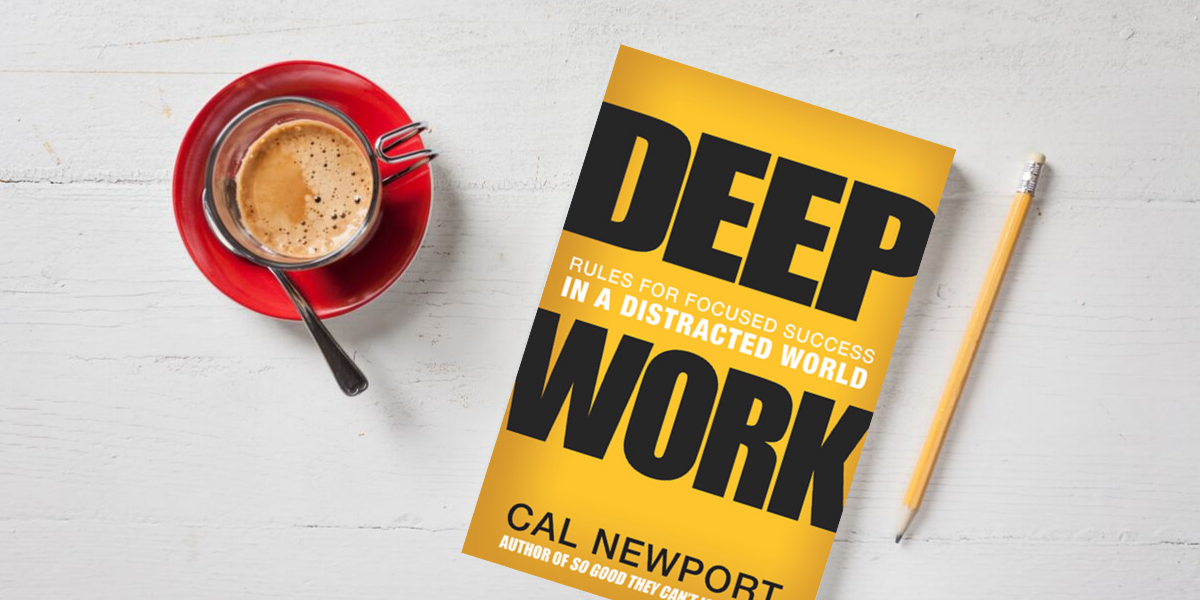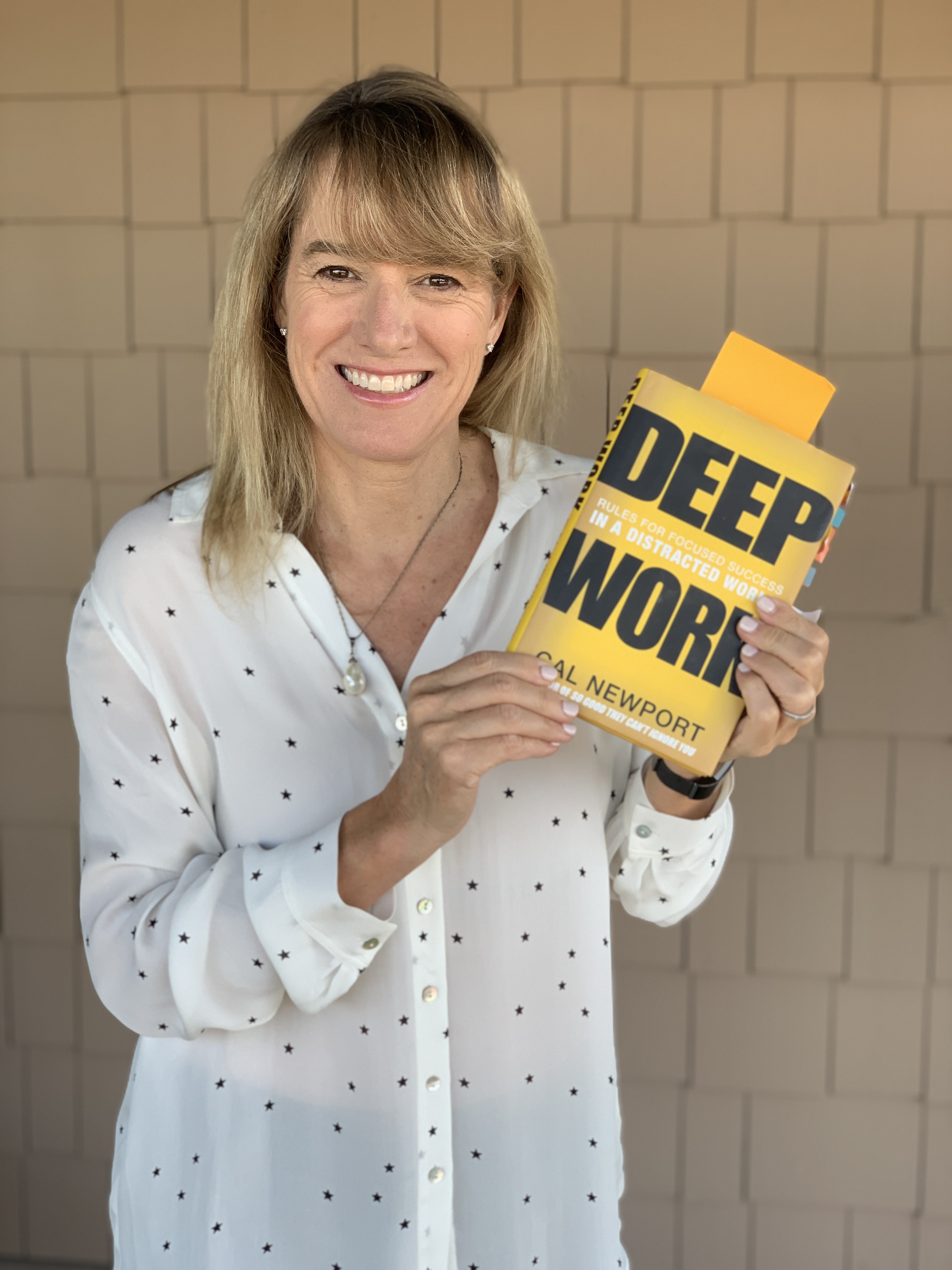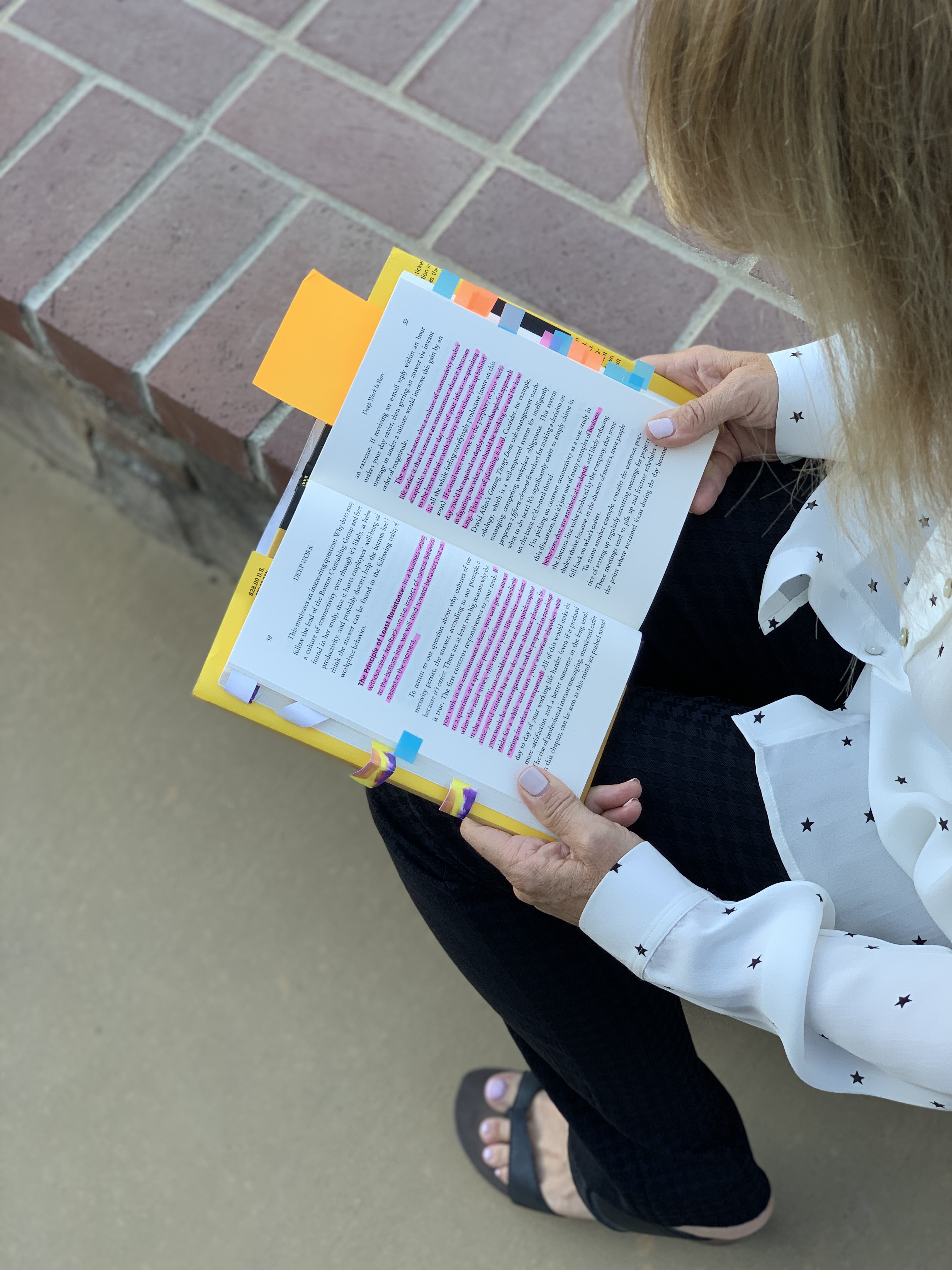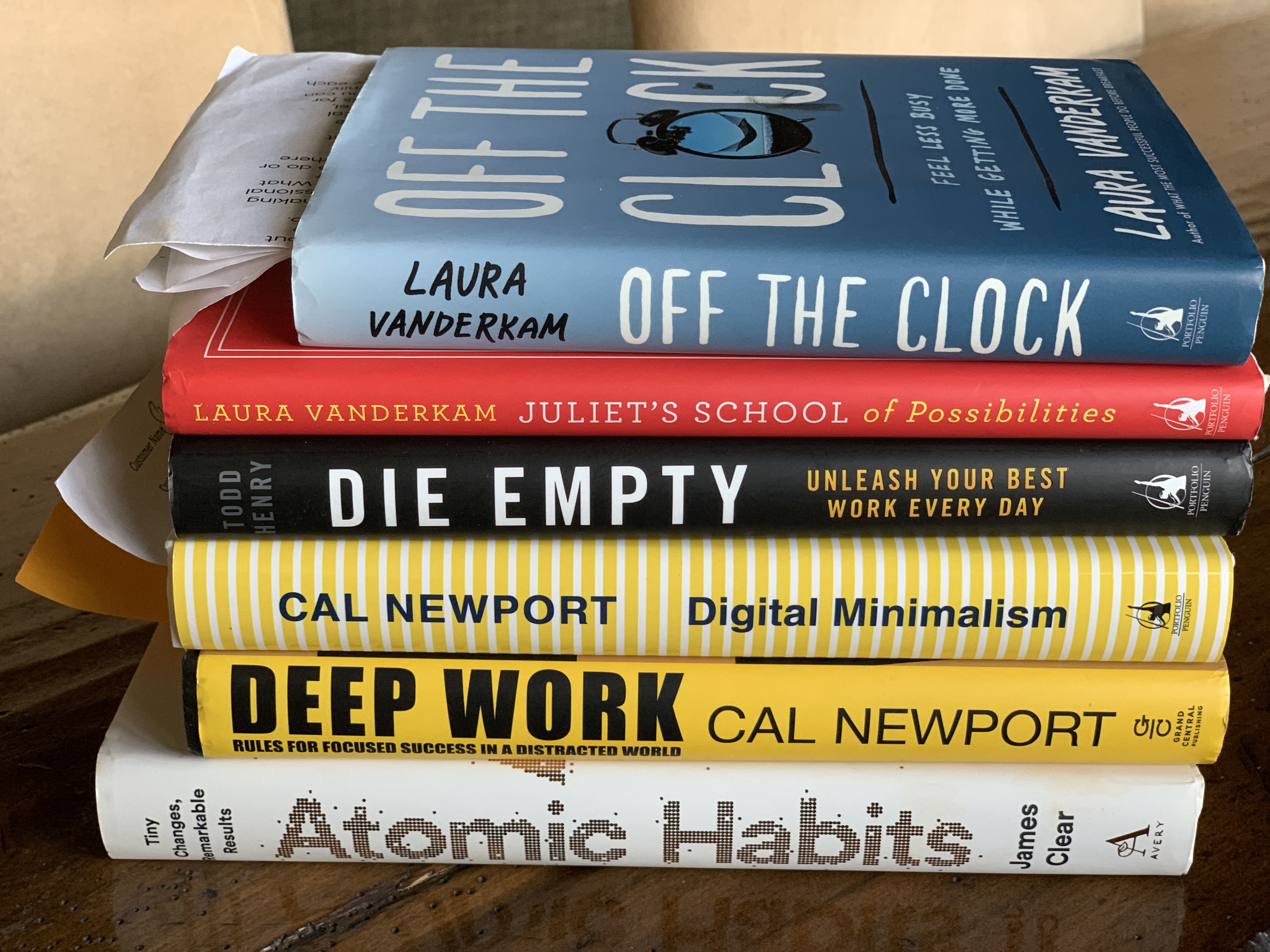 Cal Newport’s book, Deep Work, has positively impacted me and shifted my thinking.
Cal Newport’s book, Deep Work, has positively impacted me and shifted my thinking.
…all activities, regardless of their importance, consume your same limited store of time and attention. If you service low-impact activities, therefore, you’re taking away time you could be spending on higher-impact activities.
-Cal Newport
While I still haven’t managed to make all of the necessary changes to allow for the amount of deep work time I desire in my life, having more focused, deep work time remains a priority.
Deep work for me includes my time researching and writing articles and books, developing new resources, tools, podcast episodes, and workshops.
These creative endeavors take time and focus.
At my company’s weekly meeting this Tuesday, I’m presenting some of my key take-aways from Deep Work to my co-workers. So I find myself once again reflecting on the main ideas and insights I gained from the book.

Here is the downloadable worksheet we’ll be using for our Deep Work book club discussion.
My Review of Deep Work (Goodreads & Amazon)
“My life will be forever changed. I’m committed to increasing the amount of deep work I do. I am going to assess the tools (including social media) I currently use that prevent me from doing more of the work that is both deep and satisfying.”
Summary
Deep work is the ability to focus without distraction on a cognitively demanding task. It’s a skill that allows you to quickly master complicated information and produce better results in less time. Deep work will make you better at what you do and provide the sense of true fulfillment that comes from craftsmanship. In short, deep work is like a super power in our increasingly competitive twenty-first century economy. And yet, most people have lost the ability to go deep—spending their days instead in a frantic blur of e-mail and social media, not even realizing there’s a better way.
In Deep Work, author and professor Cal Newport flips the narrative on impact in a connected age. Instead of arguing distraction is bad, he instead celebrates the power of its opposite. Dividing this book into two parts, he first makes the case that in almost any profession, cultivating a deep work ethic will produce massive benefits. He then presents a rigorous training regimen, presented as a series of four “rules,” for transforming your mind and habits to support this skill.
A mix of cultural criticism and actionable advice, Deep Work takes the reader on a journey through memorable stories—from Carl Jung building a stone tower in the woods to focus his mind, to a social media pioneer buying a round-trip business class ticket to Tokyo to write a book free from distraction in the air—and no-nonsense advice, such as the claim that most serious professionals should quit social media and that you should practice being bored.
Deep Work is an indispensable guide to anyone seeking focused success in a distracted world.

Definitions & Key Concepts
Deep Work = Work performed in a distraction-free environment that pushes cognitive capacities to the limit, creates new value, improves your skill, and is hard to replicate.
Shallow Work = Non cognitively-demanding, logistical-style tasks that are easy to replicate.
The Deep Work Hypothesis
The ability to perform deep work is becoming increasingly rare at exactly the same time it is becoming increasingly valuable in our economy. The few who cultivate this skill and make it the core of their working life will thrive.
(Time Spent) X (Intensity of Focus) = Amount of High-Quality Work Produced
Principle of Least Resistance
We will tend toward behaviors that are easiest in the moment.
Busyness as Proxy for Productivity
In the absence of clear indicators of what it means to be productive and valuable in their jobs, many knowledge workers turn back toward an industrial indicator of productivity, doing lots of shallow work in a visible time frame (often over many hours to show they are “working hard”).
Making the Most of Free Time
…you want to eliminate the addictive pull of entertainment sites on your time and attention, give your brain a quality alternative. Not only will this preserve your ability to resist distraction and concentrate, but you might even fulfill Arnold Bennett’s ambitious goal of experiencing, perhaps for the first time, what it means to live, and not just exist.
Free time is unstructured and requires much greater effort to be shaped into something that can be enjoyed. So even our free, leisure time can be viewed in the framework of deep vs. shallow (Similar to the “effortful fun” Laura Vandkerkam describes in Off the Clock.)
The Rules of Deep Work
#1 Work Deeply
Add routines & rituals designed to minimize the amount of willpower (which is limited) to get into a state of unbroken attention.
Build rituals of deep work, minimizing friction in the transition to depth:
Decide where you will work and for how long.
Decide rules/processes for how you will work once you start (e.g. ban on internet use, answering phone calls & messages; breaks after a set amount of time.)
Decide how you’ll support your work: materials, apps (internet-blocker), timer, comforts (e.g. coffee, comfy slippers, good chair), co-worker to support you (working in same environment for accountability).
Decide on your “depth philosophy”:
Monastic = Eliminate or radically minimize shallow obligations.
Bimodal = Divide time, dedicating clearly defined stretches to deep pursuits.
Rhythmic = “Chain Method”: A simple, regular habit that you do every single day (e.g. Seinfeld’s daily writing).
Journalistic = Fit deep work whenever you can fit into your schedule, usually placed on your schedule by week or month.
- Focus on the wildly important – identify a small number of ambitious outcomes to pursue during your deep work hours.
- Keep a compelling scoreboard.
- Create accountability.
- Rest, be “lazy,” because downtime aids insights & helps recharge energy needed to work deeply.
- Remember that work that replaces evening downtime is usually not that important.
- Have a strict endpoint to your work day that includes a shutdown ritual: Make sure every incomplete task, goal, or project has been reviewed and you have confirmed either a plan you trust for completion or captured it in a place that will be revisited. Say out loud, “Shutdown complete.”
#2 Embrace Boredom
- Don’t take breaks from distraction, take breaks from focus.
- Meditate productively (walks/runs).
- Structure your deep thinking: What question do you want to answer or problem do you want to solve?
#3 Quit Social Media
I propose that if you’re a knowledge worker—especially one interested in cultivating a deep work habit—you should treat your tool selection with the same level of care as other skilled workers, such as farmers.
- Beware of the “any benefit” approach to network tool selection.
- Use the craftsman approach to tool selection: Identify the core factors that determine success and happiness in your personal and professional life. Adopt a tool only if its positive factors substantially outweigh its negative impacts.
- Identify main, high-level goals in both professional & personal life.
- List 2-3 most important activities that help satisfy those goals.
- Consider what network tools you currently use.
- Ban yourself from using all social media for 30 days. See results/impact after.
After 30 days of this self-imposed network isolation, ask yourself the following two questions about each of the services you temporarily quit:
1. Would the last 30 days have been notably better if I had been able to use this service?
2. Did people care that I wasn’t using this service? (p. 205)
- Put more thought into your leisure time.
#4 Drain the Shallows
- When you have fewer hours, you usually spend them more wisely.
- Deep work is exhausting – capacity is between 1-4 hours per day.
- Schedule every minute of your day (avoid autopilot).
We spend much of our day on autopilot—not giving much thought to what we’re doing with our time. This is a problem. It’s difficult to prevent the trivial from creeping into every corner of your schedule if you don’t face, without flinching, your current balance between deep and shallow work, and then adopt the habit of pausing before action and asking, “What makes the most sense right now?”
At the beginning of each workday, turn to a new page of lined paper in a notebook you dedicate to this purpose. Down the left-hand side of the page, mark every other line with an hour of the day, covering the full set of hours you typically work. Now comes the important part: Divide the hours of your workday into blocks and assign activities to the blocks. For example, you might block off nine a.m. to eleven a.m. for writing a client’s press release. To do so, actually draw a box that covers the lines corresponding to these hours, then write “press release” inside the box.
Without structure, it’s easy to allow your time to devolve into the shallow—e-mail, social media, Web surfing. This type of shallow behavior, though satisfying in the moment, is not conducive to creativity. With structure, on the other hand, you can ensure that you regularly schedule blocks to grapple with a new idea, or work deeply on something challenging,
- Fixed-Schedule Productivity = Finish your work by 5:00 – work backwards to find productivity strategies to make it happen.
- Default answer is “no.”
- Become hard to reach (if your job allows).
- Use process-centric responses to emails so that you use the minimum number of messages to close the loop. Ask, “What is the PROJECT represented by this message, and what is the most efficient (in terms of messages generated) process for bringing this project to a successful conclusion?”
Example:
Email Received:
It was great to meet you last week. I’d love to follow up some of those issues we discussed. Do you want to grab a coffee?
Process-Centric Response:
I’d love to grab coffee. Let’s meet at the Starbucks on campus. Below I listed two days next week when I’m free. For each day, I listed three times. If any of those day and time combinations work for you, let me know. I’ll consider your reply confirmation for the meeting. If none of those date and time combinations work, give me a call at the number below and we’ll hash out a time that works. Looking forward to it.
My Take-Aways
- I need routines around email, e.g. checked & answered at the same 2-3 times every day, use TextEdit to streamline responses. Only check email when able to answer (from computer with access to whatever I need to respond).
- I think a journalistic approach to writing is best for me. I’d like to schedule at least two one-hour deep work writing blocks weekly, preferably more.
- Determine social media processes/rules. Use Buffer (scheduling) and have set, scheduled times for engaging/responding. Take a complete social media break for December and evaluate after the break what to keep using in 2020.
- Measure/track time my spent on deep work and my time spent on email, social media, and other shallow work. Use planner/calendar to jot down start/end times.
- Set end point of work day (5:30 pm) and create a shutdown ritual that includes closing loop on tasks/goals: put outstanding, unfinished tasks in Basecamp (our project management program), write my “top 3” priorities for the following day.
- Use craftsman approach to analyze all of my apps and network tools. I’ve added many that I don’t utilize regularly.
The next step in this strategy is to consider the network tools you currently use. For each such tool, go through the key activities you identified and ask whether the use of the tool has a substantially positive impact, a substantially negative impact, or little impact on your regular and successful participation in the activity.
Ask:
Do they serve a purpose?
Are they redundant with something else I use?
If I take the time to learn to use them better/more effectively, will they help me reach my goals?
How can I use them more effectively?
Any that I should get rid of?
Further Listening/Reading
https://www.npr.org/2017/07/25/539092670/you-2-0-the-value-of-deep-work-in-an-age-of-distraction

Deep Work: Rules for Focused Success in a Distracted World, Cal Newport
Digital Minimalism: Choosing a Focused Life in a Noisy World, Cal Newport
Atomic Habits: An Easy & Proven Way to Build Good Habits & Break Bad Ones, James Clear
Die Empty: Unleash Your Best Work Every Day, Todd Henry
Off the Clock, Laura Vanderkam
